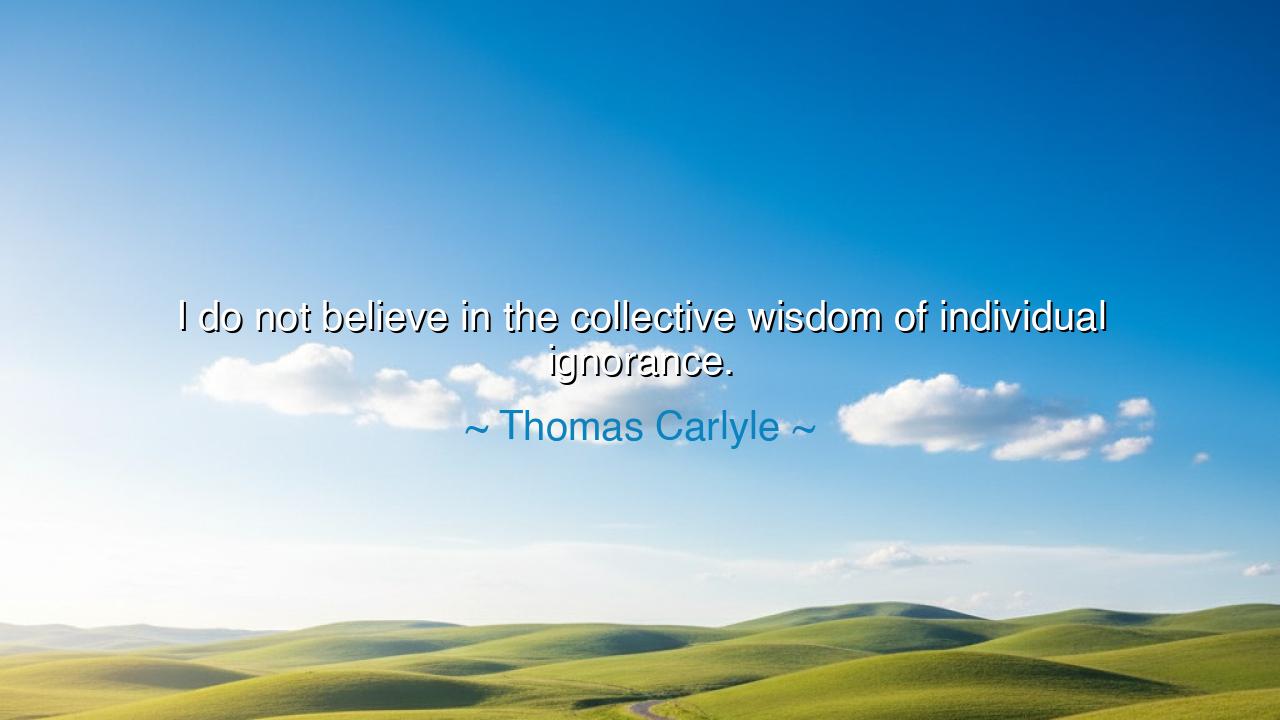
I do not believe in the collective wisdom of individual






Thomas Carlyle, fierce prophet of the nineteenth century, declared with thunder: “I do not believe in the collective wisdom of individual ignorance.” These words are both a rebuke and a warning. For too often, men suppose that if enough voices are joined together, truth will somehow appear. Yet Carlyle reminds us that the multitude, if each man is blind, does not create sight. A thousand ignorances joined do not weave wisdom; they weave only louder folly.
Ignorance, even when multiplied, remains ignorance. The crowd may roar with certainty, but certainty without knowledge is only noise. Carlyle, ever skeptical of empty popularity, warns that true guidance cannot come from the mob’s passion alone. Wisdom arises not from numbers, but from truth-seekers, from those who are willing to think deeply, to learn patiently, to stand even against the multitude if the multitude is wrong.
History proves this with clarity. In ancient Athens, the great philosopher Socrates was condemned by the will of the many. The crowd, driven by ignorance and suspicion, judged him unworthy to live. Yet history remembers Socrates as the father of philosophy and his judges as blind. Here the so-called collective wisdom of the people was nothing but collective error, proof of Carlyle’s warning that ignorance, even when democratic, is no foundation for truth.
By contrast, consider the resolve of Abraham Lincoln during the American Civil War. At times, even his own people urged compromise with slavery to end the conflict. But Lincoln refused, trusting not in the voice of ignorant expedience, but in the deeper wisdom that freedom and justice were worth the struggle. Had he bowed to the clamor of the crowd, the Union would have been preserved in shame. By resisting the ignorance of the many, he secured the liberty of millions.
O children of tomorrow, hear this lesson: do not mistake numbers for truth. The shout of the multitude may be loud, but if born of ignorance, it leads only to ruin. Seek instead the quiet voice of wisdom, even if it is but one against a thousand. For truth is not measured by the counting of hands, but by the light it carries through the darkness. Carlyle’s words stand as a torch: beware the roar of the crowd, and walk instead with those who know.






Pphongnguyen2004
This quote makes me reflect on historical examples where mass ignorance led to disastrous outcomes. Could it also explain why populist movements sometimes succeed despite flawed reasoning? I wonder if there are strategies to harness collective action effectively without falling into the trap of uninformed consensus. How do we cultivate both widespread awareness and critical thinking to ensure collective decisions are genuinely wise?
LPLan Pham
I feel conflicted reading this. On one hand, it seems to highlight the dangers of mass opinion driven by ignorance, but on the other, it could be seen as dismissive of ordinary people’s contributions. How do we reconcile the need for informed guidance with the democratic ideal that everyone’s voice matters? Is there a threshold of knowledge or awareness that legitimizes collective decision-making?
TLThuy Linh
This perspective challenges the common belief that groups inherently produce better solutions than individuals. Could it be that the quality of collective decisions depends entirely on the knowledge of the participants? I also wonder if this applies to modern contexts like social media, where large groups share opinions that may be uninformed. How can we prevent collective ignorance from shaping policies or cultural norms?
NCTruong Nguyen Cong
I find this statement both provocative and worrying. Does it imply that relying on the masses for wisdom is inherently flawed? If so, what mechanisms should societies put in place to ensure decisions are informed rather than blindly popular? I’m also curious about the role of education and expertise—can a knowledgeable minority guide collective choices without undermining democratic principles?
DHNguyen Dinh Huy
This quote makes me question the idea of democracy or majority rule. If a large group of people lacks knowledge or understanding, can their consensus truly lead to the right decision? It raises concerns about how public opinion is shaped by misinformation or lack of critical thinking. How do we balance the value of collective input with the risks of collective ignorance, especially in politics or societal decision-making?